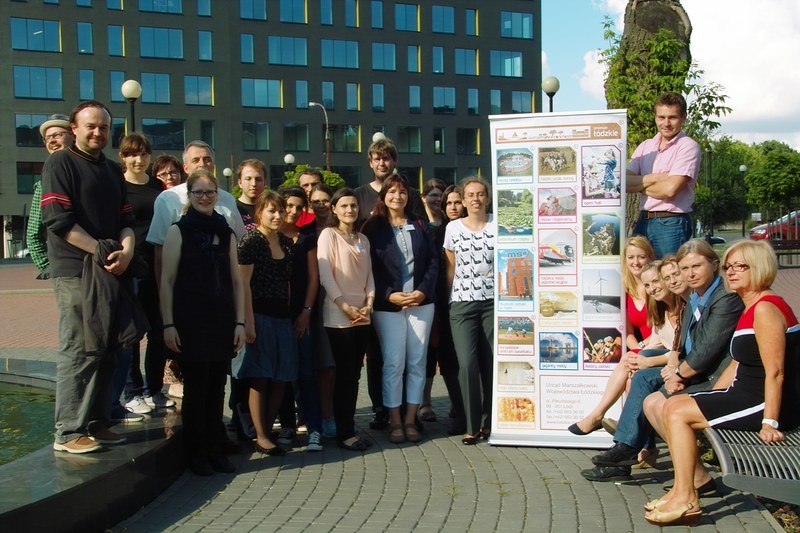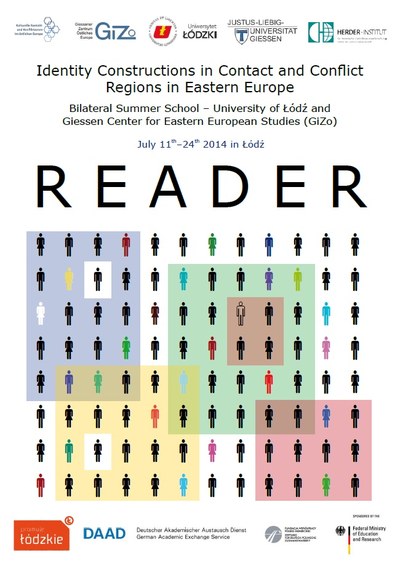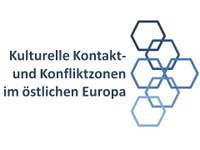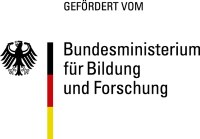Summer School in Łódź
Bilateral Summer School – Justus-Liebig-University Giessen and University Łódź about "Identity constructions in Contact- and Konfliktregions in Eastern Europe"
The University of Łódź and the DAAD network "Cultural contact and conflict zones" organized a bilateral Summer School on "Constructions of Identity in Contact Zones and Conflict Regions in Eastern Europe” from July 11th to July 24th 2014. The target group included doctoral students and advanced Master's students (linguistics, literature and history as well as political, social and cultural sciences) from Gießen and from Łódź, who worked on projects related to the Summer School topics.

The contact and conflict regions described are taken to mean imperial and national-linguistic border zones, transitional regions and conflict zones as well as urban areas that are characterized by ethnic, linguistic, denominational and other culturally-shaped scenarios of contact and conflict. We also take into account those zones of conflict that no longer exhibit the rich cultural diversity they once possessed but in which this former diversity nevertheless still plays a significant role in memory and identity politics, as well as in historical and literary reflection. The scale of contact and conflict zones is ranging from low-conflict coexistence (as between Russians and Tatars in Kazan or between Belarusians and Russians in Minsk) over politics of memory and identity of conflict-laden rivalries (as in the 1990s, in Cluj-Napoca) to the violent escalation of cultural conflict patterns (such as 1939 to 1945 in Łódź and from 1991 to 1995 in Croatia). Underlying is a geographically broad definition of Eastern Europe, in addition to East Central, Southeast and Eastern Europe are the interaction zones with Turkic-speaking cultures in Post-Soviet States included.
Identities in such regions are being discussed and constructed in many different ways, because of language, national, ethnic, political, religious or social factors. Corresponding to the topics of the Summer School the focus is on projects from languages, literature, history and social as well as cultural studies.
Basic issues of the Summer School were for example:
- How do identity attributions in conflict regions and situations emerge and how are they being supported and spread by the media?
- What are the characteristics of identity constructions? Are certain attributes in certain contact and conflict trends predominant?
- Which significance have linguistic, religious and ethnic boundaries and how are they being used?
- How are identity constructions being processed and remembered with regard to literature, journalism and politics?
- Are identity constructions in contact and conflict zones open to the influence of language policy? How can national, ethnic, religious, and other Identities be linguistically constructed and how are they being conveyed or constructed by the media?
- To what extent are politics of memory (reconciliation strategies) capable of dismantling or reactivating conflict-laden identity constructions?
- How are conflicts in ethnical, religious or national contact zones linguistically and culturally processed?

The doctoral students presented their projects in interdisciplinary workshops modarated by the lecturers of Giessen and Łódź. Furthermore the Summer School comprised plenary session and evening lectures of the universities of Giessen and Lodz. In addition, an extensive cultural program in the city of Łódź and in the region were offered.
| TeilnehmerIn (Universität/Institut) | Vortragsthema |
|---|---|
| Błaszczyk, Karolina (Universität Łódź) | Analyse der Identitätskonstruktionen anhand ausgewählter Werken von polnischen „Post-migrationsschriftsteller“ |
| Brückmann, Jana (JLU Gießen) | Medial (self-)representations of Alexandr Lukashenko and Vladimir Putin (zusammen mit Konrad Hierasimowicz) |
| Cercel, Cristian Dr. (Herder-Institut Marburg) | Projekt Unkenrufe |
| Fink, Swetlana (JLU Gießen) | Die protestantischen Minderheiten in Polen-Litauen des 16. und 17. Jahrhunderts |
| Gutsul, Nazarii (JLU Gießen) | „Sonderlager“ für ukrainischen Soldaten: das soziales und kulturelle Leben der Kriegsgefangenen in Wetzlar (1915-1919) |
| Komnenovic, Dora (JLU Gießen) | The Leaden Nineties in Former Yugoslav Countries: Searching for Alternatives to Social Amnesia |
| Krainski, Agata (JLU Gießen) | Wahrheit und Fiktion - Wahrheit durch Fiktion? Zu Andrzej Barts Roman "Fabryka muchołapek" |
| Kunze, Steve (JLU Gießen) | Die Wahl der sächsischen Kurfürsten August II. zum König von Polen 1697 |
| Leschnik, Hubert (JLU Gießen) | (Wieder-)Geburt regionaler Identität in Schlesien |
| Milewska-Pindor, Nadina (Universität Łódź) | Russian women prose writing at the turn of the 1980s and 1990s. In quest for identity. |
| Pankova, Ekaterina (JLU Gießen) | The new role of the Russian language in the post-Soviet space with a focus on the Baltic states |
| Pawlik, Jerzy (Universität Łódź) | Embodied aura of political leadership in ethnic and cultural politics of identity |
| Popov, Vadim (JLU Gießen) | Die "Lisowczycy" und das Polenbild in Russland im 17. Jh. |
| Rajchel, Dorota (Universität Łódź) | Multiculturalism as the artefact: on example of Łódź |
| Ramisch, Franziska (JLU Gießen) | Der Kulturkampf und die polnische Nationalbewegung |
| Stefańska, Magda (Universität Łódź) | Wer ist der Freak des zwanzigsten Jahrhunderts? Rückkehr zu der Tradition der Freak Shows in der zeitgenössischen Popkultur. |
| Tobiasz, Aleksandra (Universität Łódź) | Central European literary ways of “escape” from History – Polish perspective |
| Woźniak, Julita (Universität Łódź) | Integration of Polish migrants into the UK society from the perspective of British print media |
| Wylot, Marta (Universität Łódź) | Die Textsorte Glosse in der deutschen und polnischen Presse- eine kontrastive Studie |
 |  |
|
|---|---|---|
 |
 |


